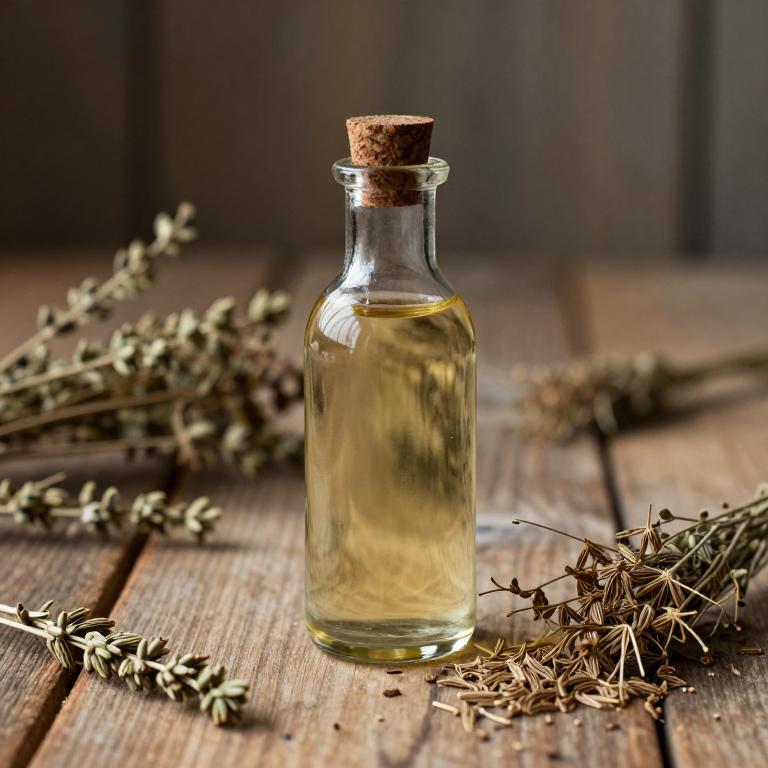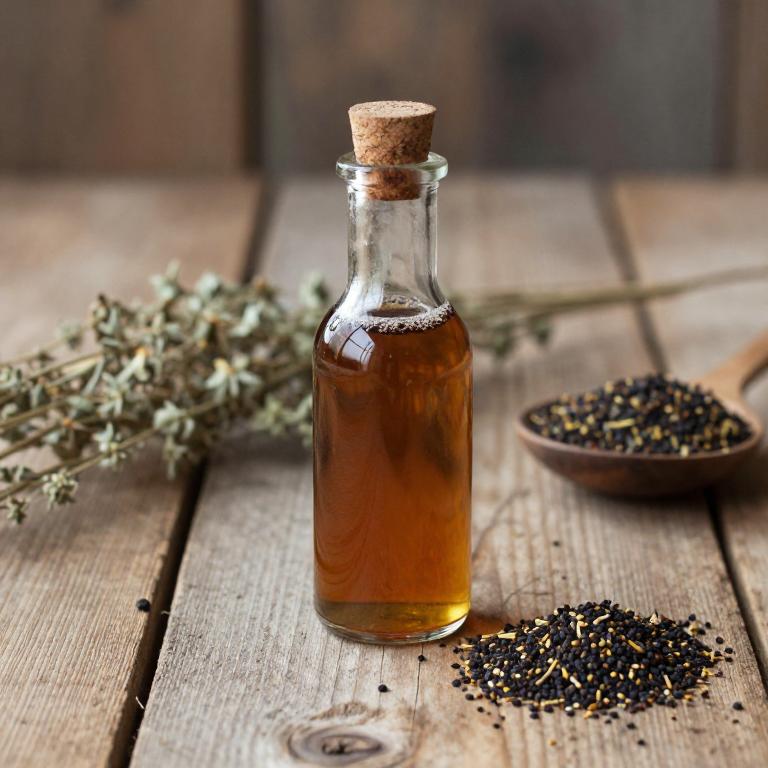10 Best Herbal Syrups For Nausea

Herbal syrups for nausea are natural remedies that combine plant-based ingredients with sweeteners to soothe stomach discomfort.
Common herbs used in these syrups include ginger, peppermint, licorice root, and fennel, all of which are known for their anti-emetic properties. These syrups are often preferred by individuals seeking alternatives to pharmaceutical medications due to their mild side effect profiles. They can be easily incorporated into daily routines, either as a preventive measure or to alleviate symptoms of motion sickness, morning sickness, or digestive upset.
However, it is important to consult with a healthcare provider before using herbal syrups, especially for pregnant individuals or those with underlying health conditions.
Table of Contents
- 1. Ginger (Zingiber officinale)
- 2. Licorice (Glycyrrhiza glabra)
- 3. Black pepper (Piper nigrum)
- 4. Fennel (Foeniculum vulgare)
- 5. Chaste tree (Vitex agnus-castus)
- 6. Cumin (Cuminum cyminum)
- 7. Ceylon cinnamon (Cinnamomum verum)
- 8. Peppermint (Mentha piperita)
- 9. Black cumin (Nigella sativa)
- 10. Scots pine (Pinus sylvestris)
1. Ginger (Zingiber officinale)

Zingiber officinale, commonly known as ginger, has been widely used for centuries to alleviate nausea and digestive discomfort.
Herbal syrups made from fresh or dried ginger root are a popular natural remedy for motion sickness, morning sickness, and postoperative nausea. These syrups are often preferred over pills because they are easier to consume and can be quickly absorbed into the bloodstream. The active compounds in ginger, such as gingerol and shogaol, are believed to help reduce inflammation and stimulate digestion, thereby easing nausea symptoms.
However, it is important to consult a healthcare provider before using ginger syrup, especially during pregnancy or if taking other medications.
2. Licorice (Glycyrrhiza glabra)

Glycyrrhiza glabra, commonly known as licorice root, has been traditionally used in herbal medicine for its soothing properties, and its syrup form is often employed to alleviate nausea.
The active compounds in licorice root, such as glycyrrhizin and flavonoids, may help reduce stomach irritation and ease digestive discomfort. Licorice syrup is particularly beneficial for individuals experiencing nausea due to indigestion, motion sickness, or gastrointestinal inflammation. However, long-term use of licorice root can lead to side effects like hypertension and fluid retention due to its mineralocorticoid-like effects.
Therefore, it is advisable to consult a healthcare provider before using licorice syrup, especially for prolonged periods or in combination with other medications.
3. Black pepper (Piper nigrum)

Piper nigrum, commonly known as black pepper, has been traditionally used in herbal medicine for its potential to alleviate nausea.
The active compound in black pepper, piperine, is believed to enhance digestion and reduce gastrointestinal discomfort. When prepared as a herbal syrup, piper nigrum may help soothe the stomach and ease symptoms of nausea by stimulating digestive enzymes and improving gut motility. This natural remedy is often recommended for mild cases of nausea, such as those caused by motion sickness or morning sickness.
However, it is important to consult a healthcare provider before using black pepper syrup, especially for prolonged or severe nausea, to ensure safety and effectiveness.
4. Fennel (Foeniculum vulgare)

Foeniculum vulgare, commonly known as fennel, has been traditionally used in herbal syrups to alleviate nausea due to its carminative and antispasmodic properties.
The essential oils in fennel, particularly anethol, help relax the smooth muscles of the gastrointestinal tract, reducing cramping and discomfort associated with nausea. Herbal syrups made from fennel are often recommended for pregnant women experiencing morning sickness, as they are generally considered safe in moderate amounts. These syrups can be prepared by steeping fennel seeds in honey or sugar syrup, allowing the beneficial compounds to be extracted for easier consumption.
While fennel syrups may provide relief for mild nausea, it is advisable to consult a healthcare provider before use, especially for individuals with preexisting medical conditions or those taking other medications.
5. Chaste tree (Vitex agnus-castus)

Vitex agnus-castus, commonly known as chasteberry, has been traditionally used to support hormonal balance and alleviate symptoms of nausea, particularly in women experiencing hormonal fluctuations.
Herbal syrups made from vitex are often formulated to be easily absorbed and gentle on the stomach, making them a popular alternative for those seeking natural remedies. These syrups may help regulate the digestive system and reduce feelings of queasiness by influencing the body's natural rhythms and hormone levels. While research on its efficacy for nausea is limited, many users report positive effects, especially when combined with other herbal remedies or lifestyle adjustments.
As with any herbal supplement, it is advisable to consult a healthcare professional before use, particularly for pregnant or nursing individuals.
6. Cumin (Cuminum cyminum)

Cuminum cyminum, commonly known as cumin, has been traditionally used in herbal medicine for its digestive benefits, including relief from nausea.
When prepared as a herbal syrup, cumin can help soothe the stomach and reduce symptoms of motion sickness, morning sickness, and digestive discomfort. The essential oils in cumin, such as limonene and cineole, are believed to have carminative and antiemetic properties that aid in calming the gastrointestinal tract. This syrup is often made by simmering cumin seeds with honey or sugar to preserve its potency and enhance flavor.
It is a natural alternative for those seeking to manage nausea without pharmaceutical interventions, though it is advisable to consult a healthcare provider before use, especially for pregnant women or individuals with chronic health conditions.
7. Ceylon cinnamon (Cinnamomum verum)

Cinnamomum verum, commonly known as true cinnamon, has been traditionally used in herbal syrups to alleviate nausea due to its soothing and anti-emetic properties.
The essential oils in cinnamon, particularly cinnamaldehyde, may help calm the digestive system and reduce feelings of queasiness. When prepared as a syrup, cinnamon is often combined with other herbs like ginger or fennel to enhance its effectiveness. This natural remedy is particularly useful for mild nausea caused by motion sickness, morning sickness, or gastrointestinal discomfort.
However, it is important to consult a healthcare provider before use, especially for pregnant individuals or those with underlying health conditions.
8. Peppermint (Mentha piperita)

Mentha piperita, commonly known as peppermint, is widely used in herbal syrups to alleviate nausea due to its calming and digestive properties.
The essential oils in peppermint, particularly menthol, help soothe the gastrointestinal tract and reduce the sensation of queasiness. These syrups are often formulated with other soothing herbs like ginger or licorice to enhance their effectiveness. Peppermint syrup is particularly effective for nausea caused by indigestion, motion sickness, or morning sickness during pregnancy.
However, it is important to consult a healthcare provider before use, especially for individuals with certain medical conditions or those taking other medications.
9. Black cumin (Nigella sativa)

Nigella sativa, commonly known as black cumin, has been traditionally used in herbal medicine for its potential health benefits, including alleviating nausea.
Nigella sativa herbal syrups are often prepared by infusing the seeds in honey or sugar syrup, making them easy to consume and suitable for various age groups. The active compounds in nigella sativa, such as thymoquinone, may help soothe the digestive system and reduce feelings of nausea. While some studies suggest its effectiveness in managing nausea, more research is needed to confirm its efficacy and safety.
As with any herbal remedy, it is advisable to consult a healthcare professional before use, especially for individuals with existing medical conditions or those taking medications.
10. Scots pine (Pinus sylvestris)

Pinus sylvestris, commonly known as Scots pine, has been traditionally used in herbal medicine for its calming and digestive properties.
Herbal syrups made from Pinus sylvestris are often prepared by infusing the resin or needles in a sugar base, creating a soothing and aromatic remedy. These syrups are believed to help alleviate nausea by soothing the digestive system and reducing stomach discomfort. The essential oils present in the pine resin may contribute to their antiemetic effects, making them a natural alternative for mild cases of nausea.
While more research is needed, some herbal practitioners recommend Pinus sylvestris syrup as a gentle and effective remedy for motion sickness and morning sickness.